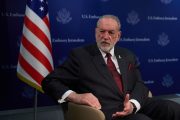
On November 15, U.S. President Joe Biden and Chinese President Xi Jinping met at the Filoli estate, a country house and gardens around 30 miles south of San Francisco, before a summit of the Asia-Pacific Economic Cooperation (APEC) forum, to discuss issues ranging from military conflicts to drug trafficking.
Both leaders were accompanied by a team of top government officials, and shared their opening statements with reporters before official discussions.
Biden reminded Xi that they last met in Bali a year and a day ago and that he was open to candid and honest talks about Sino-U.S. ties, which he said had to be “managed responsibly” so they do not morph from competition to conflict.
“I’ve never doubted what you told me,” Biden told Xi.
For his part, Xi pointed out that “a lot has happened” since Bali, and that among the many grave problems facing the world are rising protectionism and the “sluggish” post-pandemic global economy.
The Sino-American relationship is the “most important bilateral relationship in the world” and should be worked on amid ongoing major changes, Xi said, presumably alluding to the rise of a multipolar global order.
China and the United States should overcome their differences and find a way to get along, Xi added.
“It is unrealistic for one side to remodel the other,” Xi told Biden, adding that the planet is “big enough for [our] two countries to succeed.”
Here are the key issues discussed:
Taiwan
The leaders had a “substantial” discussion on Taiwan, with Xi telling Biden that Taiwan is the biggest and most dangerous matter facing both countries, a senior U.S. official told reporters.
The Chinese leader said that China had no plans for military action against Taiwan in the near future, the official elaborated. Xi claimed that Beijing prefers a peaceful reunification with Taiwan, but also is exploring situations under which force could be used.
Biden said he “stressed the importance of peace and stability in the Taiwan Strait” and urged Xi to respect Taiwan’s electoral process, the U.S. official continued.
In response, Xi stated, “Look, peace is … all well and good, but at some point we need to move towards resolution more generally,” the same U.S. official revealed.
“President Xi … underscored that this was the biggest, most potentially dangerous issue in US-China relations, laid out clearly that, you know, their preference was for peaceful reunification but then moved immediately to conditions that the potential use of force could be utilized,” the senior U.S. official told reporters, referencing Xi’s remarks on Taiwan.
“President Biden responded very clearly that the longstanding position of the United States was … determination to maintain peace and stability,” the official said.
China has ramped up military activity to compel Taiwan to acknowledge Beijing’s sovereignty, despite vehement opposition from the government in Taipei.
Senior U.S. military officers have posited that Xi has ordered the People’s Liberation Army (PLA) to be prepared to invade Taiwan by 2027. Beijing has not excluded the idea of using force to take the island, though it has never elaborated about war preparations.
Restoration of Bilateral Military Communications
Washington and Beijing will restore communication channels between their respective militaries, Biden told reporters after meeting Xi.
“We’re back to direct, open clear direct communication,” Biden said, adding that the contacts would help forestall misunderstandings during a period of tense relations between the superpowers. “Vital miscalculations on either side can cause real, real trouble with a country like China or any other major country.”
Biden proclaimed that his talks with Xi were “some of the most constructive and productive discussions we’ve had,” while admitting that both sides still had disagreements.
Based on reports from China’s state-run Global Times newspaper, the contacts “based on equality and respect” will entail working meetings between defense departments and a bilateral “maritime security consultation mechanism.”
“China does not have a plan to surpass or unseat the United States. Likewise, the United States should not scheme to suppress and contain China,” Xi told Biden, as per reports by Xinhua.
The United States and China have been at odds over Taiwan, and slammed each other for igniting tensions in the Asia-Pacific and beyond. Relations worsened in early 2023 when the Pentagon alleged Beijing had flown a spy balloon over American territory.
China, on its end, reiterated that the airship was a weather balloon that had veered off course. The sides later traded barbs pertaining to risky military maneuvers involving fighter jets and warships.
Biden made a “very clear request” that both countries institutionalize military-to-military communications, and U.S. Secretary of Defense Lloyd Austin will meet his Chinese counterpart when that person is named, a senior U.S. official revealed.
Beijing’s version of the Biden-Xi meeting, via the Communist Party-controlled Chinese state media, highlighted the need for more collaboration, dialogue, and respect.
China and the United States should set an example for other countries, Xi told Biden, and promote cooperation on trade, agriculture, climate change, and artificial intelligence, Chinese media reported. An official briefed on the talks admitted that Beijing was seeking a show of respect from the U.S. side during Xi’s trip.
China severed military talks with the United States after then-House Speaker Nancy Pelosi visited Taiwan in August 2022.
Biden said he and Xi agreed to high-level communications. “He and I agreed that each one of us can pick up the phone call directly and we’ll be heard immediately.”
However, in a remark likely to annoy the Chinese, Biden told reporters later that he had not changed his view that Xi was a dictator. “Well, look, he is. I mean, he’s a dictator in the sense that he is a guy who runs a country that is a communist country,” Biden said.
Fentanyl
Biden and Xi agreed to work on tackling the problem brought about by the opioid fentanyl, a major cause of drug overdoses in the United States, according to a U.S. official familiar with the Xi-Biden talks.
Under the agreement, China will pursue specific chemical companies that produce fentanyl precursors.
Middle East Tensions
The two leaders also discussed the intensification of violence in the Middle East, with Biden asking China to leverage its diplomatic clout with Iran and urge it to avoid steps that could be viewed as provocative, the same senior U.S. official told reporters.
Chinese officials told the U.S. side that they had participated in talks with Iran on regional risks.
Xi arrived in California on November 14, for the 2023 meeting of the APEC. The inter-governmental forum includes 21 countries from the Pacific Rim.




